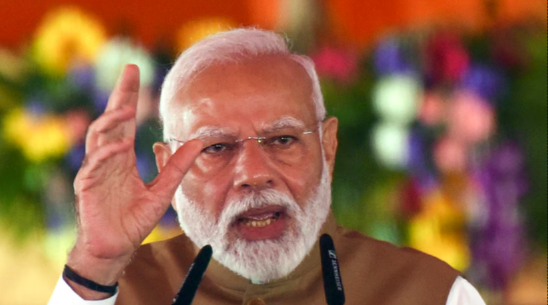
Protests Erupt During Modi’s New York Visit, Sikh and Human Rights Groups Demand Accountability
Exclusive coverage by IndoUs Tribune:
Uniondale, New York, September 22, 2024 — Prime Minister Narendra Modi’s visit to New York sparked widespread protests, with hundreds of demonstrators gathering outside the Nassau Veterans Memorial Coliseum to express their outrage over his government’s policies. The protests, organized by multifaith coalitions and human rights groups, included members from Sikh, Muslim, Christian, and Dalit communities who accuse Modi of promoting religious intolerance, authoritarianism, and human rights abuses in India.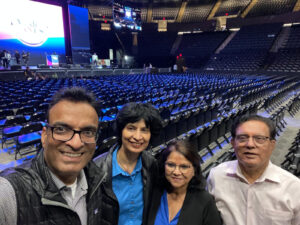 Protesters held banners and chanted slogans condemning Modi’s administration, with many highlighting the 2002 Gujarat riots and ongoing violence in places like Manipur as examples of his failure to protect India’s minorities. “Modi, Modi, you can’t hide, you’re responsible for genocide,” echoed through the streets as demonstrators compared Modi’s leadership to authoritarian regimes, accusing him of fostering a climate of fear and division.
Protesters held banners and chanted slogans condemning Modi’s administration, with many highlighting the 2002 Gujarat riots and ongoing violence in places like Manipur as examples of his failure to protect India’s minorities. “Modi, Modi, you can’t hide, you’re responsible for genocide,” echoed through the streets as demonstrators compared Modi’s leadership to authoritarian regimes, accusing him of fostering a climate of fear and division.
Sikh Activists Lead the Charge
One of the most vocal groups at the protest was the Sikh community, who rallied against what they describe as Modi’s government’s crackdown on Sikh separatist movements and its role in transnational repression. Several protesters, advocating for the creation of Khalistan, condemned the Indian government’s treatment of Sikhs, both within India and abroad.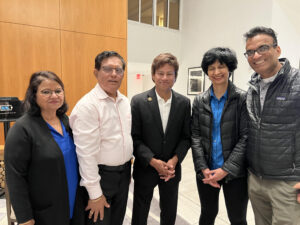 Holding placards demanding justice and waving Khalistani flags, the Sikh activists accused Modi’s regime of targeting Sikh activists internationally. The community is particularly incensed by incidents like the recent assassination of Hardeep Singh Nijjar, a prominent Sikh leader in Canada, which they believe was orchestrated by Indian intelligence agencies. The protest reached a fever pitch when demonstrators struck an effigy of Modi with shoes, symbolizing their deep discontent with his leadership.
Holding placards demanding justice and waving Khalistani flags, the Sikh activists accused Modi’s regime of targeting Sikh activists internationally. The community is particularly incensed by incidents like the recent assassination of Hardeep Singh Nijjar, a prominent Sikh leader in Canada, which they believe was orchestrated by Indian intelligence agencies. The protest reached a fever pitch when demonstrators struck an effigy of Modi with shoes, symbolizing their deep discontent with his leadership.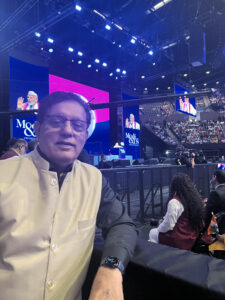 Baljeet Singh, a protest organizer, spoke to IndoUS Tribune, expressing the anger of the Sikh diaspora. “Modi’s government has marginalized our community, both in India and through their actions abroad. We will not stand by while our people are oppressed.”
Baljeet Singh, a protest organizer, spoke to IndoUS Tribune, expressing the anger of the Sikh diaspora. “Modi’s government has marginalized our community, both in India and through their actions abroad. We will not stand by while our people are oppressed.”
Human Rights Violations in Focus
The protests were not limited to Sikh activists. Human rights organizations, including Justice for All and Hindus for Human Rights, participated, condemning Modi’s government for its alleged violations of democratic principles. Speakers addressed various concerns, ranging from the revocation of Article 370 in Kashmir to the controversial Citizenship Amendment Act (CAA), which critics say discriminates against Muslims.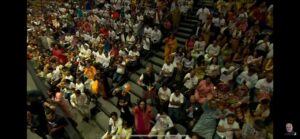 Imam Saffet Catovic of Justice for All, who has been vocal against ethnic violence globally,called on the international community to hold Modi accountable. “What we’re witnessing in India is a systematic targeting of religious minorities, and it is the responsibility of the global community to ensure justice,” he said.
Imam Saffet Catovic of Justice for All, who has been vocal against ethnic violence globally,called on the international community to hold Modi accountable. “What we’re witnessing in India is a systematic targeting of religious minorities, and it is the responsibility of the global community to ensure justice,” he said.
Additionally, activists criticized the ongoing violence in Manipur, where the destruction of Christian churches and the displacement of thousands have raised alarms about the Indian government’s handling of religious tensions.
Modi’s Meeting with Sikh Leaders
In response to the protests and growing unrest within the Sikh community, Modi met with various community leaders, including Sikh representatives, during his visit to New York. The private meetings were part of a broader effort by Modi to engage with the Indian diaspora and address concerns over his administration’s policies.
Sources familiar with the discussions revealed that Sikh leaders brought up the issue of religious repression, the targeting of activists abroad, and the demand for a separate Sikh state. While details of the conversation remain largely undisclosed, some attendees described the discussions as “tense but constructive,” with Modi expressing his commitment to maintaining India’s unity and addressing communal grievances.
Harmeet Singh, one of the Sikh leaders present at the meeting, told IndoUS Tribune, “We voiced our concerns directly to Prime Minister Modi. While his responses were measured, we emphasized that actions speak louder than words. Our community needs justice, both at home and abroad.”
A Divided Diaspora
The protests in New York encapsulate the deep divisions within the Indian diaspora over Modi’s leadership. While the prime minister enjoys widespread support among many in the diaspora for his economic policies and strongman image, significant sections, particularly those representing India’s minority communities, remain deeply critical of his tenure.
For the protesters, the demonstrations were an opportunity to shed light on issues they feel have been ignored or suppressed by Modi’s administration. As the prime minister continues his international tour, the protests in New York serve as a stark reminder of the growing discontent among the global Indian community, particularly concerning India’s handling of religious and ethnic diversity.